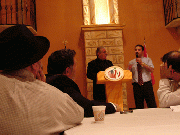DEARBORN — Discussions among local leaders and activists began Wednesday about having a unified Arab American voice leading up to November elections, when about 50 people representing various organizations met at the Lebanese American Heritage Club.

|
| Imad Hamad (L) of the American-Arab Anti-Discrimination Committee, attorney Nabih Ayad, The Arab American News Publisher Osama Siblani (at podium), Ali Sobh, of the American Lebanese Center and local businessman Mohamad Yassine during a meeting in Dearborn on Wednesday about upcoming local and national elections. PHOTO: Khalil AlHajal/TAAN |
Members of the Arab American Political Action Committee (AAPAC), the Yemeni American Political Action Committee (YAPAC), the American-Arab Anti-Discrimination Committee (ADC), the Arab American Institute (AAI), ACCESS, several area mosques and other groups attended, giving short speeches and arguments on how to mobilize the community and decide which candidates to support, on both national and local levels.
The fact that the campaign of presumptive Democratic presidential nominee Sen. Barack Obama has recently opened an office in Dearborn, at 10415 West Warren Avenue, became a recurring topic, some citing it as an opportunity to become involved, others insisting that the presence of the office should not ensure automatic support for the candidate.
“Our community is looking for substance,” said Kalid Shajrah, of YAPAC. “We have to be careful not to sell ourselves short.”
Osama Siblani, publisher of The Arab American News and AAPAC president, who led the meeting, said that neither of the major presidential candidates has made serious efforts to address concerns of Arab Americans.
“Why do they address AIPAC (American Israel Public Affairs Committee) and they do not address AAI or ADC?” he asked about frequent visits the candidates have made to groups who lobby for Israel.

|
| Valerie Smith, of the Arab American Institute, takes notes at a meeting of various Arab American community leaders at the Lebanese American Heritage Club in Dearborn on Wednesday, where activists gathered to discuss issues and strategies for upcoming local and national elections. PHOTO: Khalil AlHajal/TAAN |
Siblani and others cited civil rights, immigration and foreign policy as the three issues that presidential candidates should be challenged on when addressing concerns of highest interest to Arab Americans.
“Every day there are civil rights issues,” Siblani said.
He said that bank accounts of Arab Americans and American Muslims are being abruptly closed, immigrants are being arrested and detained for unreasonably long periods in inhumane conditions, then deported and humiliated and travelers with Arabic names are being held at the U.S.-Canadian border, questioned, searched and humiliated.
“The issues are staring us in the face,” he said.
Others said that if support is eventually offered to a candidate, demands should be madeto ensure input from the community into appointments made at local executive offices, including immigration offices of ICE and USCIS, the U.S. Attorney’s office, and the FBI.
On the local level, speakers at the meeting expressed support for Dearborn Board of Education member Aimee Blackburn, who they said has consistently looked out for the interests of Arab Americans.
Valerie Smith, of the Washington-based Arab American Institute ? which recently opened an office in Dearborn ? said that direct involvement in campaigns and long-term involvement with political parties are the keys to Arab Americans gaining influence on policy locally and nationally.
She cited recent efforts by local Arab American students to sign people up as precinct delegate candidates for the Democratic Party, as a way of ensuring involvement and recognition.
AAI has also been circulating for months a petition that highlights issues most important to Arab Americans for the purpose of making clear to political candidates how to get the attention of citizens of Arab descent.
Several at the meeting implored the group to commit to continued, regular, focused meetings.
Hasan Newash, of the Palestine Office, said that the community often gathers to protest in times of crisis, but never seems to follow through and continue efforts to exert influence.
“We gather and we do something and then everything dissipates and goes away,” he said. “We have to brandish the fact that we have a process and we have unity? in order to exert the kind of pressure we need on the candidates.”
Siblani said the meeting was only the beginning of a series of gatherings to come, with the focus of mapping out and consolidating plans to get out the vote, interact with campaigns and prepare financial contributions.
He said the first meeting, full of emotion and diverse voices, lacked concrete planning and clear outcomes. But the fact that they came together and agreed on more meetings and real process, he said, represents progress.
“I am very encouraged by this meeting,” he said. “We know that we have shortcomings? But we sent a message.”
He said just the fact that the meeting occurred will force candidates to look at the community and say “They’re gong to get involved.”
“We have organizations in this community working around the clock in every election,” he said. “We have made progress? Next time we meet we will be more organized. We will be more precise.”
Part of the goal of the effort to organize and mobilize, Siblani said, is to get campaigns to recognize that visiting a mosque is not something to be ashamed of, “to have a muhajaba behind you at a rally is not an insult to your campaign,” and “having a middle name like ‘Hussein’ is something to be proud of.”






Leave a Reply